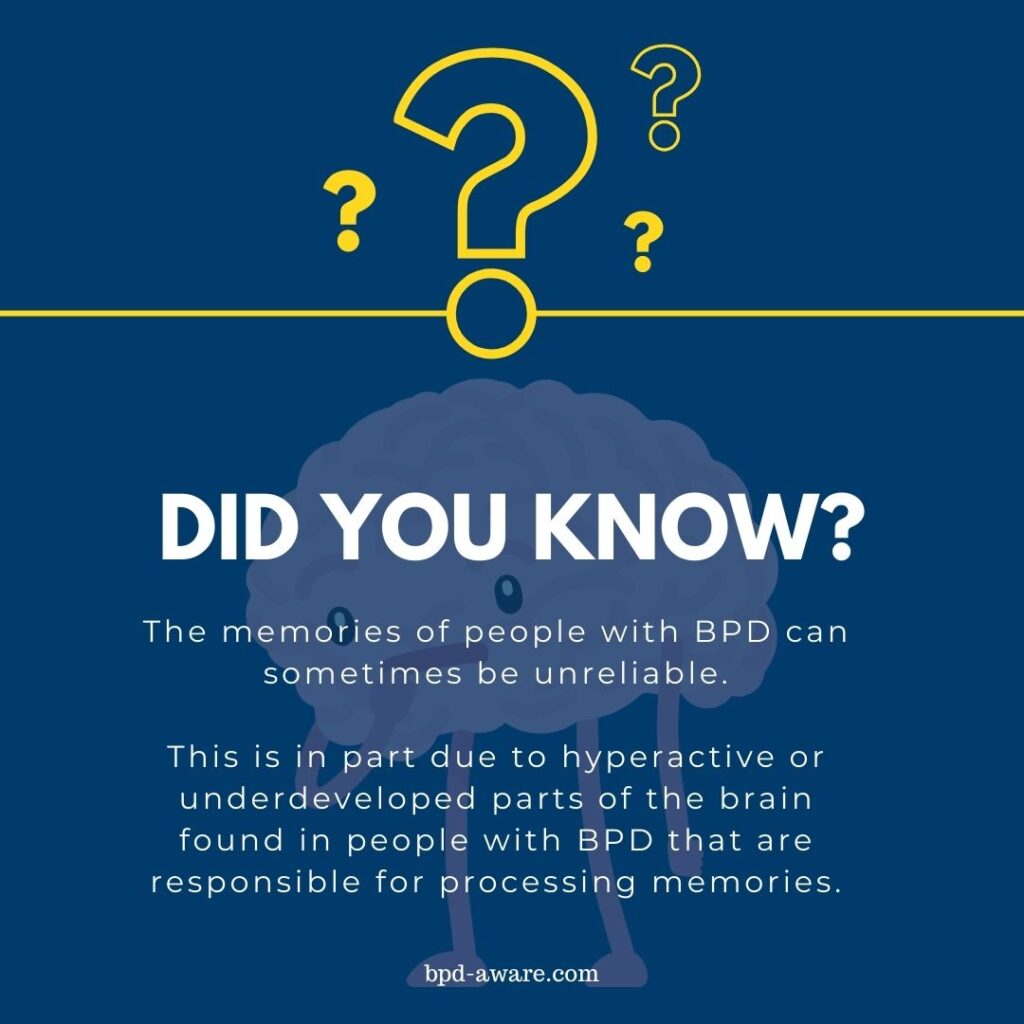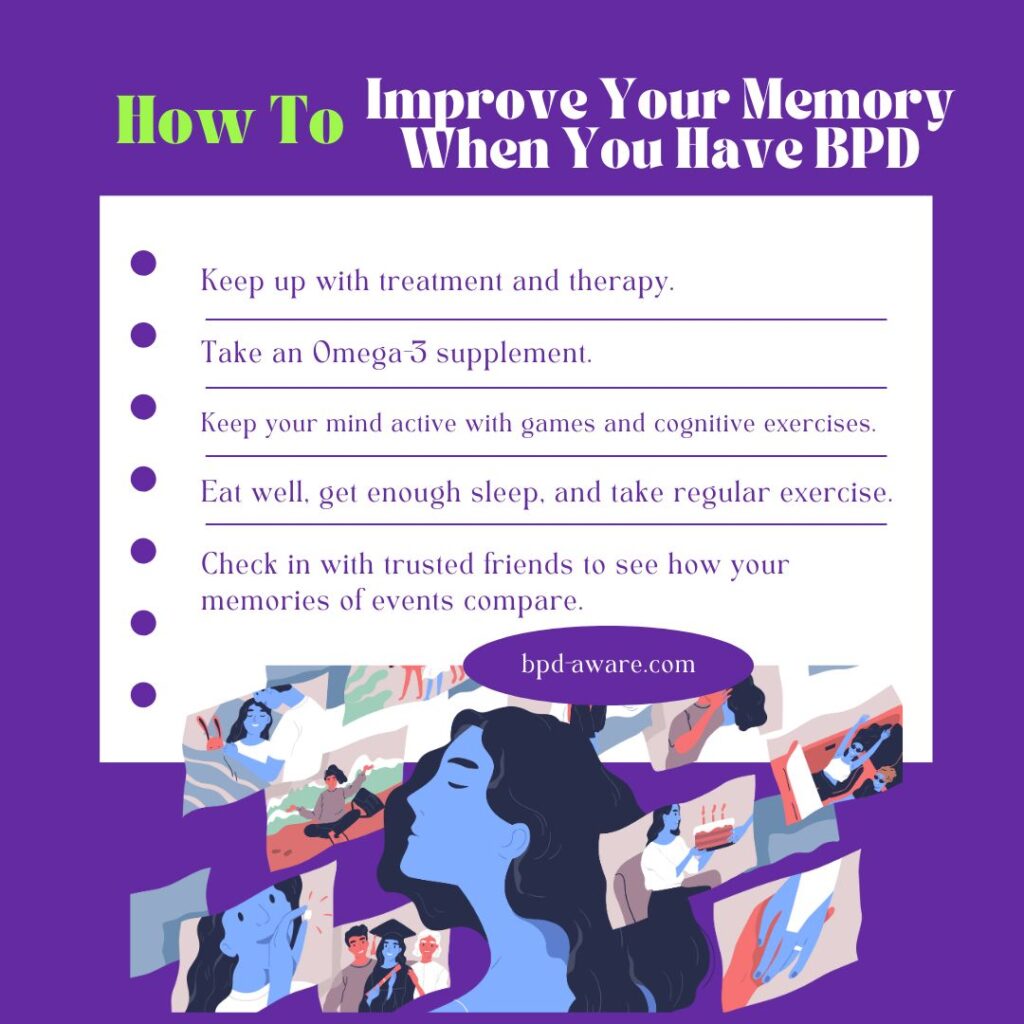Memories are fundamental to the way we live as they influence so many aspects of our lives. Our memories inform our identity, guide our behavior, help us retain skills and knowledge, impact our emotional well-being, and more. False or forgotten memories can create a massive strain on relationships.
Human memory is rarely a perfect record of past events. It can be influenced by several factors, including emotional state, the level of attention during the event, the time between the event and the attempt to recall it, social influences, and cognitive ability. And people with mental health conditions like Borderline Personality Disorder (BPD) often remember things differently than those who are neurotypical.
So how exactly does BPD affect memory and is there anything that can be done about it? To answer that question, we first need to look at the symptoms of BPD and how memory works.
How Human Memory Works
Memory is a complex process that involves several different parts of the brain and has multiple stages. On top of that, there are also different types of memory.
The first stage of creating a memory is called encoding. This is where a sensory input, such as sight or sound, is transformed into data that can be stored in the brain. This initial input goes through the sensory memory (which lasts only a few seconds) and is moved to short-term memory.
Short-term memory holds the data for roughly 30 seconds and is limited in how much it can store. The average short-term memory can only hold around seven “units” of information, with a little leeway on either side.
Rehearsed data (such as school learning) or any data deemed important is transferred to long-term memory. Here it can be kept indefinitely. Long-term memory has a vast capacity which is why we can remember so many things.
Memory also involves the retrieval of this data. It involves recall, recognition, and the ability to more quickly relearn data that has been partially forgotten.
The memory process uses several parts of the brain, including the hippocampus, the amygdala, the pre-frontal cortex, the basal ganglia, and the cerebellum. You may recognize some of those parts of the brain from our article about the BPD brain.
This is the basic knowledge of the memory we need for the sake of this article.

How BPD Can Interfere With Memories
The hippocampus, amygdala, and pre-frontal cortex all take part in the formation of memories. However, each of these parts of the brain is less efficient or more hyperactive than the neurotypical brain. That means that the formation of memories is likely to be less reliable than normal for people with BPD.
These deficiencies also play a role in the formation of the core symptoms of BPD. BPD has nine core symptoms. Of these nine symptoms, someone needs to experience at least five regularly to receive an official diagnosis. Each of these symptoms can have a severe effect on cognitive functions, and this includes the ability to remember things accurately.
- Fear of Abandonment: Abandonment and rejection fears are very common among people with BPD. They can manifest in several ways, including self-isolation or clinginess. The mind rarely works at its best when it’s afraid. This fear can cause false memories to justify maladaptive behaviors used as a form of self-defense, or real memories to be forgotten if they don’t fit the narrative the mind wants in that moment.
- Unstable Relationships: Unstable relationships can negatively impact memory due to the chronic stress and emotional instability they cause. Consequently, individuals may experience fragmented or distorted memories.
- Unclear or Shifting Self-Image: A shifting self-image can impact memory by causing inconsistencies in how someone recalls memories about themselves as the context and meaning may change alongside their self-image.
- Impulsivity: Impulsive behavior often occurs when someone isn’t focusing or considering the past or future in any way. This lack of attention to anything but the present makes it harder to form lasting memories. Also, the chaotic state of impulsive behavior can make it more difficult to create and retrieve memories.
- Self-Harm: The emotional distress which leads to self-harm can have several effects on memory. First, the negative emotions at play can bias memory recall, causing the individual to remember similar distressing times. Some individuals may suppress memories associated with self-harm, causing them to not process their thoughts and feelings around that time.
- Emotional Instability: The emotional state someone is in when they experience an event can have a massive influence on how they remember it. If they’re upset, they’re likely to remember only the bad. Similarly, if they’re happy, their memories are more likely going to focus on the good things. People with BPD often swing quickly between intense moods, which can have a massive effect on how they remember certain events or conversations.
- Chronic Feelings of Emptiness: Chronic feelings of emptiness, produce a numb response to most situations. Just as being overly emotional can color memories, a lack of emotion can dull them. Memories become less vivid and detailed when you are feeling numb inside.
- Intense Anger: BPD rage can happen suddenly and is the height of negative, destructive emotions. In such an emotional state, it becomes impossible to objectively pick up on the details of the event in question. The proceeding sense of shame and guilt can also play tricks on the memory. It can be a lot more pleasant for the borderline brain to forget the whole ordeal happened, or at least forget their fault in the incident. On the flip side, some with BPD dwell on negative events and may be able to think of nothing except the rage they felt and the hurt they may have caused as a result.
- Paranoid Ideation or Severe Dissociation: Paranoia appears to harm memory. This could be because the individual’s mind is laser-focused on the idea that someone or something is out to get them and is expending less energy on the attempt to accurately remember things and more energy on figuring out potential escape routes or other ways out of the situation. Likewise, dissociation can cause people to forget entire days worth of short-term memories as their minds aren’t focused on the people, situations, and events directly around them.
It’s also worth noting that many people with Borderline Personality Disorder also have co-occurring conditions such as depression and anxiety, both of which can negatively affect memory.
Improving Your Memory
It can be frightening to realize that your memory might not be 100% accurate. It’s worth noting once more though that the vast majority of people don’t have anything close to a perfect memory. However, your memory is an important tool and it’s well worth considering anything you can do to improve it, especially when you have BPD.
One of the first things we always recommend here is that anyone with BPD should be seeking treatment for their condition. Therapy and medication are proven to have a positive effect in many areas for most sufferers, even in the memory department.
We recommend taking an Omega-3 supplement. Omega-3 has been proven to improve cognitive functions and has also proven to be beneficial for the symptoms of Borderline Personality Disorder. If you want to find out more about this, read our article: The Supplement That Can Reduce Symptoms of BPD
Keeping your mind and memory active with mental games and cognitive exercises such as puzzles, sudoku, crosswords, and other brain-training games has proven to be of benefit.
Looking after your health is also important to memory. That means the tried-and-tested formula of eating a nutrient-dense diet, getting enough high-quality sleep, exercising regularly, avoiding illicit substances, and taking care of any pains or illnesses as they arise.
Finally, having a friend, partner, or family member (or several) that you trust can be hugely beneficial. You can relay your versions of events to them and see how well they match up. This can help you learn where your memory and thought processes deviate from the norm. However, it is important to remember that no one’s memory is perfect, so you both might have some errors here and there.

Final Thoughts
How we remember things influences us in many ways. Memories teach us about our past and project our behavior going forward. However, memories are not always accurate, particularly in those of us with BPD.
Accepting and admitting that our memories might not always be accurate is an important step. That doesn’t mean allowing people to gaslight you, it means accepting that the picture of a situation you’ve painted in your head might not be 100% accurate. That scowl you swore you remember seeing on someone’s face might not have happened. That negative tone in someone’s voice might never have been there.
By accepting our memories are not always 100% accurate, we can begin to dig ourselves out of negative thought patterns and unhelpful ways of thinking. It’s by no means a be-all end-all cure for BPD, but another tool in the box we can use to improve ourselves.
Our brains and memories can be improved and tweaked, just like any other piece of hardware and software. By undertaking treatment, taking self-care seriously, and keeping your mind active, you can boost your cognitive functions, including your memory.
Borderline Personality Disorder doesn’t have to be a life sentence. With hard work and dedication to the healing process, real improvements can happen.
Sources, Resources, and Further Reading
- BPD and Memory Loss: https://mentalhealth.banyantreatmentcenter.com/blog/bpd-and-memory-loss/
- Enhanced emotion-induced amnesia in borderline personality disorder: https://pmc.ncbi.nlm.nih.gov/articles/PMC2633116/
- Borderline Personality Disorder and Memory Loss: Unraveling the Connection: https://www.grouporttherapy.com/blog/borderline-personality-disorder-memory-loss
- Exploring the Link between BPD and Memory Loss: https://www.mentalcurve.com/post/exploring-the-link-between-bpd-and-memory-loss
















